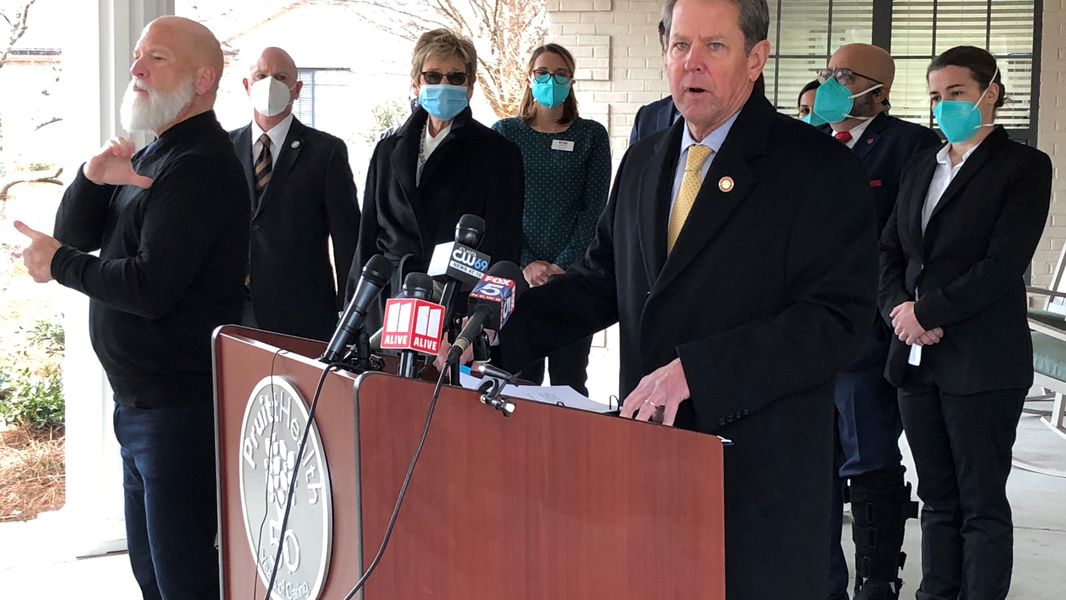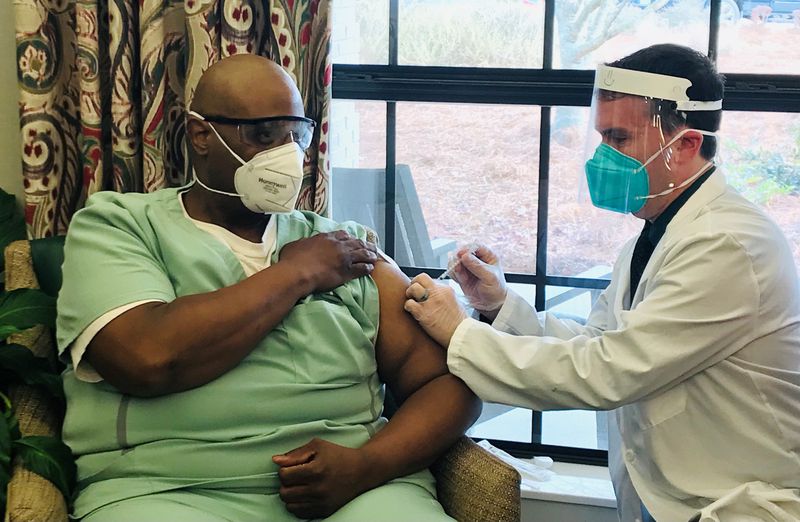
Georgia Gov. Brian Kemp speaks during a news conference Dec. 28, 2020, administering the first coronavirus vaccinations to nursing home personnel.
By J. Scott Trubey and Eric Stirgus
‘COVID-19 is still here, and it still presents a threat,’ Gov. Kemp says as vaccines roll out to senior care staff.
Doses of coronavirus vaccine started to arrive at senior homes and other long-term care facilities in Georgia on Monday, a watershed moment amid the raging pandemic.
For 10 long months, the coronavirus has ripped through long-term care facilities nationwide, leaving behind a trail of serious illness and death. No demographic has been harder hit.
State data show COVID-19 has killed more than 3,100 Georgia long-term care home residents. It will likely take months to complete vaccinations at senior homes statewide.
Gov. Brian Kemp said at a media briefing Monday at a Gainesville nursing and rehab center that 95% of the state’s long-term care homes have signed up for vaccinations with pharmacy giants CVS Health and Walgreens, which are managing the vaccine rollout for such facilities under a contract with the federal government.
Local health departments will manage vaccinations at smaller personal care homes.
Georgia is grappling with its third wave of the virus, one that has come with a higher number of confirmed infections and hospitalizations than the previous two. On Christmas Eve, Georgia set a new daily record with more than 10,000 combined confirmed and probable coronavirus cases.
On Monday, Georgia reported 3,941 net new confirmed and probable cases of COVID-19, along with five newly confirmed deaths and another two considered “probable” coronavirus deaths. But reporting is likely still uneven following test site and lab closures over the Christmas holiday.
The number of people currently hospitalized for the virus — 4,342 on Monday afternoon — is at a record high. Kemp said officials expect this week to re-deploy a field hospital at the Georgia World Congress Center in Atlanta to serve as a relief valve for hospitals across the state.
Georgia public health officials stress that it will take months for the general public to be vaccinated, and officials fear another spike in cases following Christmas and New Year’s Eve celebrations.
Kemp pleaded with Georgians to practice social distancing, limit the size of gatherings, wear face coverings and follow other public health guidance. He noted that Northeast Georgia Health System, which operates a large hospital in Gainesville, is seeing its highest-ever volume of COVID-19 patients.
“COVID-19 is still here, and it still presents a threat to the people of our great state,” he said.
But the governor has yet to take any new steps to restrict businesses or gatherings, as other states have in recent weeks, preaching personal responsibility.
Toomey: vaccine a ‘firewall’
Monday’s arrival of new vaccine doses offered a glimmer of hope.
“We are eager to see the vaccine make its way quickly and safely to the most vulnerable,” Kemp said.
Vaccinations of first responders and health care workers started in Georgia earlier this month under the federal government’s Operation Warp Speed program, which partnered with the pharmaceutical industry to develop vaccines for COVID-19 in less than one year.
Dr. Kathleen Toomey, the state’s public health commissioner, said residents and staff of long-term care homes make up more than 37% of the more than 9,700 confirmed COVID-19 deaths in Georgia even though they make up only about 5% of coronavirus infections in the state.
Staff members at The Oaks-Limestone, a PruittHealth facility on the outskirts of Gainesville, were some of the first long-term care providers in the state to receive their initial shots. Vaccinations will start among residents in facilities statewide in the coming days, officials said.
Toomey said vaccinating workers provides a “firewall” to protect residents.
Jonathan Harris, a senior certified nursing assistant, was the first Pruitt employee to receive a shot of the Pfizer vaccine, officials said.
“It gives me a measure of hope. Hope for a better tomorrow, hope for my residents and that they’re safe,” Harris said in a video taken from inside center moments after receiving his first shot.

Jonathan Harris, a senior certified nursing assistant at The Oaks — Limestone, a PruittHealth nursing home in Gainesville, was the first Pruitt employee to receive a shot of the Pfizer vaccine, state officials said.
Vaccine rollout
Georgia officials decided health care workers, long-term care residents and employees would be the first groups that could get the vaccine. About 582,000 Georgians fit in those categories.
The next groups include police officers, the elderly and employees deemed critical such as power plant workers. State officials have said it may not be until mid-to late-January before those groups can get vaccinated.
CVS and Walgreens began vaccinations in a small number of long-term care homes on Dec. 18. That effort expanded the following week. Georgia is one of dozens of states in the third and largest wave of care-home vaccinations.
Nationally, the rollout has been bumpy. Federal officials took the blame for shipping fewer doses than expected to several states, including Georgia.
The Trump administration projected before the rollout the government would vaccinate 20 million Americans by the end of the year. About 2 million Americans have received their first vaccine shot, according to news accounts.
About 43,500 Georgians have received their first shot, state data show.
Several nursing home providers said Monday they were eager to receive the vaccine although some logistical details were unclear, such as whether employees or residents would be vaccinated first. Those details, they said, were being determined in consultation with CVS and Walgreens.
Some facilities were prepared to receive it Tuesday. Others, such as Presbyterian Homes of Georgia, which has six facilities statewide, said they’ve been told they will receive their first doses within two weeks.
“We would love for it to be here faster, but the fact that it is on its way shows there is light at the end of the tunnel, so we’re happy about that,” said Gwen Hardy, the company’s chief operating officer.
Residents or a family member must sign consent forms in order to get vaccinated. Several facilities said employees are not required to get vaccinated. Some residents and workers consulted their own doctors before agreeing to get the vaccine.
Administrators are reminding residents and their families that their doors will not be open to visitors as they were before the pandemic.
“The normal we were used to (before the pandemic) is not going to happen for some time,” said Mary Newton, the chief communications officer at A.G. Rhodes, which is scheduled to begin receiving doses Tuesday. “But we see this as a turning point and we’ve got to hang on a little while longer.”
Despite having access to the vaccine, some residents and caregivers are hesitant to take it. At A.G. Rhodes, which has facilities in Cobb, DeKalb and Fulton counties, about 25% of its staff responded to an internal survey about the vaccine. Forty-six percent of the respondents said they would get vaccinated, 31% said they wouldn’t and 23% answered that they weren’t sure yet.
Read the original story on AJC.com.











